
Nephrology
The Nephrology Department is a specialized healthcare department focusing on diagnosing, treating, and managing kidney and renal-related conditions. Nephrologists are doctors specializing in nephrology and provide comprehensive care for patients with kidney disorders.
Kidney and Renal Conditions:
- Chronic Kidney Disease (CKD): Nephrologists diagnose and manage CKD, a progressive
condition characterized by a gradual loss of kidney function. They assess the stage of CKD and develop
treatment plans to slow its progression. - Acute Kidney Injury (AKI): Nephrologists provide care for patients with AKI, a sudden
and often reversible decrease in kidney function. Causes may include infections, medications, or trauma. - End-Stage Renal Disease (ESRD): Nephrologists manage patients with ESRD, a condition
in which the kidneys are permanently damaged and unable to filter waste from the blood. Treatment options may include
dialysis or kidney transplantation. - Hypertension: Nephrologists are experts in managing high blood pressure, a common
cause and complication of kidney disease. - Kidney Stones: Nephrologists provide care for patients with kidney stones, offering
treatment to relieve symptoms and prevent recurrence. - Nephrotic Syndrome: Nephrologists manage nephrotic syndrome, a condition characterized
by significant proteinuria, edema, and hypoalbuminemia.
Diagnostic Services:
- Laboratory Testing: Nephrology departments use laboratory tests to assess kidney
function, including serum creatinine, glomerular filtration rate (GFR), and urine analysis. - Imaging: Imaging techniques such as renal ultrasound, CT scans, and MRI may be used to
visualize the kidneys and urinary tract.
Treatment Modalities:
- Medications: Nephrologists prescribe medications to manage blood pressure, control
symptoms, and slow the progression of kidney disease. - Dialysis: Nephrology departments often include dialysis units where patients with ESRD
receive hemodialysis or peritoneal dialysis to filter waste from the blood. - Kidney Transplantation: Nephrologists work closely with transplant surgeons and
immunologists to evaluate and manage kidney transplant candidates and recipients. - Nutritional Counseling: Nutritionists and dietitians in nephrology departments provide
dietary guidance to manage kidney disease and prevent complications.
The Nephrology Department plays a vital role in diagnosing and managing kidney diseases, supporting patients with chronic kidney conditions, and providing life-saving treatments such as dialysis and kidney transplantation. Nephrologists and their multidisciplinary teams aim to improve the quality of life for individuals with kidney disorders and contribute to ongoing research in the field of nephrology. Regular consultations with nephrologists are essential for patients with kidney-related concerns.
Meet Our Doctors




